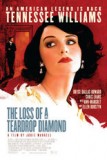| Reviews & Columns |
|
Reviews DVD TV on DVD Blu-ray 4K UHD International DVDs In Theaters Reviews by Studio Video Games Features Collector Series DVDs Easter Egg Database Interviews DVD Talk Radio Feature Articles Columns Anime Talk DVD Savant Horror DVDs The M.O.D. Squad Art House HD Talk Silent DVD
|
DVD Talk Forum |
|
|
| Resources |
|
DVD Price Search Customer Service #'s RCE Info Links |
|
Columns
|
|
|
Loss of a Teardrop Diamond, The
The year was 1957. Writer Tennessee Williams and director Elia Kazan had just followed up their Oscar-winning triumph A Streetcar Named Desire with the controversial Baby Doll, and Williams was at work on a new collaboration with the esteemed director. His new original screenplay, The Loss of a Teardrop Diamond, piqued the interest of Kazan, who considered Julie Harris for the lead, but Kazan eventually focused his interests elsewhere, and the Williams original remained unproduced... until now.
Jodie Markell's new film of Loss of a Teardrop Diamond is one of those occasional acts of cinematic archaeology (like George Hickenlooper's adaptation of Orson Welles' unproduced The Big Brass Ring screenplay, or Woody Allen's reworking of his own 1970s screenplay Whatever Works) that is interesting for the back story if for no other reason. Williams was one of our most distinctive writers, and there is pleasure in re-immersing oneself into his unique world. But recreating that world in today's cinema is a tricky proposition, and Markell doesn't quite pull it off.
The time is 1923, the place is the South (of course). Fisher Willow (Bryce Dallas Howard) is a reluctant debutante with a sketchy past and an uncertain future. She hopes to shake off her unfortunate family ties, but family also means money, and her Aunt Cordelia (a too-briefly-seen Ann-Margaret) has insisted that if Fisher wants any of her sizable inheritance, she must attend the season's debutante parties. She asks Jimmy Dobyne (Chris Evans), the handsome hired hand from a once-prominent family, to escort her. Over the course of their dates, Fisher falls for him, and he knows that returning her affections is a sensible choice, but sometimes love is more complicated than that.
In its florid language and broad characters, the picture occasionally courts self-parody (a couple of key moments brought back ill-timed memories of Christopher Durang's fracturingly funny Williams parody play, "For Whom the Southern Belle Tolls"). Wisely, though, Markell plays it mostly straight, and that seems to be the right approach. There's only one glaring error: the ill-advised use of a spotlight effect during a key moment, a theatrical device that takes us right out of the scene. The atmosphere feels right--swampy, hot, dusty--but the photography isn't terribly impressive; it's mostly shot with TV-movie style coverage, and Markell seems to have trouble staging her party scenes, which play stiff and awkwardly.
Evans' decision to underplay his role is a wise one, though he occasionally verges on inertia. Fisher is something of an impossible role, what with all the jerky mood shifts and to-the-balcony theatricality, and as likable as Howard is, she just can't make it fly. There's a sense of play-acting in both her and Evans' performances; they don't seem entirely comfortable in their period costumes and regional dialects, while supporting actors like Will Patton and the great Ellen Burstyn slip into their roles like second skin.
Williams himself isn't blameless, either. He was a great writer, yes, but not a perfect one; much of the script hasn't aged particularly well, and portions of the dialogue are overwrought, even by his standards. There are some structural flaws with the material as well--particularly the long, draggy party sequence that bogs down the second hour, finally pushing the picture into the kind of overheated melodrama it's been within a breath of for the previous 80 minutes. Markell has a hard time finding her footing after that, though she comes mighty close with a fine, delicately played final scene.
There are good scenes like that one, and several other lovely moments. But Markell's direction is too pedestrian to compensate for the overall lack of timeliness in Williams' text; she can't find a new angle from which to view the somewhat musty tale. Maybe Kazan could have worked with Williams to bring it up to the level of their previous collaborations. But we'll never know. As it stands, The Loss of a Teardrop Diamond is a curio, but not quite a success.
Jason lives in New York. He holds an MA in Cultural Reporting and Criticism from NYU.
|
| Popular Reviews |
| Sponsored Links |
|
|
| Sponsored Links |
|
|
| Release List | Reviews | Shop | Newsletter | Forum | DVD Giveaways | Blu-Ray | Advertise |
|
Copyright 2024 DVDTalk.com All Rights Reserved. Legal Info, Privacy Policy, Terms of Use,
Manage Preferences,
Your Privacy Choices | |||||||











